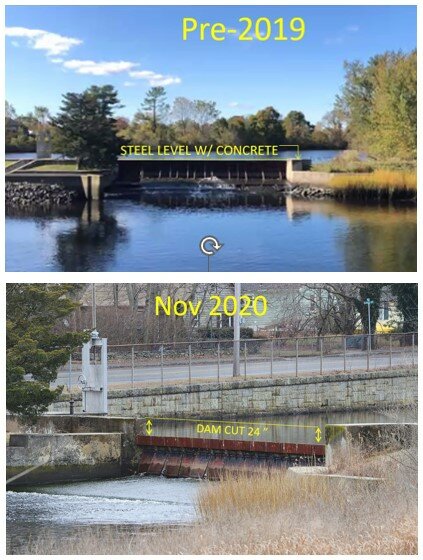Letter: Kickemuit Dam corruption?
The previous article highlighted the public concerns of unsightly mud-pits, but the greater issue is the mud that they do not see.
This item is available in full to subscribers.
Please log in to continue |
Register to post eventsIf you'd like to post an event to our calendar, you can create a free account by clicking here. Note that free accounts do not have access to our subscriber-only content. |
Day pass subscribers
Are you a day pass subscriber who needs to log in? Click here to continue.
Letter: Kickemuit Dam corruption?
To the editor:
In commentary to last weeks article and having led the Kickemuit Community Association (KCA) opposition to the BCWA dam removal project we felt compelled to provide our opinion for public knowledge.
The previous article highlighted the public concerns of unsightly mud-pits, but the greater issue is the mud that they do not see. The collusion between an unregulated “for-profit” utility company that has monopolized the basic elemental source of life from East-Bay residents, and the DEM’s willingness to ignore their own environmental Rules Regulations for Dam Safety (RRDS) to sacrifice our unique ecosystem due to years of infrastructure neglect in favor of BCWA profitability.
In 2012 DEM issued a violation to BCWA for regulatory non-compliance, after re-inspection, including a gate that was leaking and allowing salt-water into the ecosystem. BCWA contracted Pare Engineering for a consultation and produced a report with 12 practical solutions (mostly-ignored) to remedy the risks, plus two extreme alternatives:
1.) Dam removal: “…will result in loss of recreational and environmental resource and reduce flood control capacity provided by the dam.”
2.) Dam lowering: “Complete modifications to the dam to reduce height, thereby reducing volume of water that may be impounded by the dam”.
Lowering the dam cites that Pare observed “modifications” as early as 2012, despite no approval of such work as required per RRDS Section 1.7. The regs also state, per section 1.10, “Any emergency repair undertaken shall not result in significant alteration of wetlands unless authorized by permit issued by Director”.
Therefore, in October 2019, DEM records demonstrate that BCWA intentionally cut the top of the Child Street dam by 2 feet without DEM approval, in potential violation RRDS Section 1.7, resulting in saltwater intrusion into the freshwater ecosystem, therefore potentially meeting the legal definition of “significant alteration” per RRDS Section 1.10.
In turn, the BCWA used the potentially-engineered high salinity levels as a justification to remove the dam. After a closed-door meeting in potential violation of RI's Open Meetings Act, BCWA and DEM executed an official “agreement” on May 6, 2020 to prepare dam removal despite such covert modifications already underway.
On Feb. 24, 2021 during a Warren Town Council meeting (2:21:50) the BCWA director was asked if any modifications were made, the director responded no, therefore such misrepresentation is perceived as motive to bypass required law to inform abutters. On April 7, 2020 abutters requested an emergency dam inspection, but DEM declined. In June 2021 KCA submitted legal requests to DEM for documentation to support “director approval” for dam lowering and alteration of wetlands, but DEM produced no approval.
In 2021 KCA engaged State Reps. June Speakman, Jason Knight, Susan Donovan, and State Senator Walter Felag Jr., even incoming Governor Dan McKee, for support. They adopted “silence as compliance” in favor of BCWA. The Warren Town Council correctly cited that they are powerless to provide oversight.
Unlike other RI utilities BCWA is not regulated by the RI Public Utilities Commission (PUC) as result of controversial legislation enacted 43 years ago, which explains why BCWA has the highest water rates in the state and have been able to raise rates on us by 40% since 2020, including a 15% hike during the pandemic.
In closing, it is not the “WHAT”, but rather the “HOW” the BCWA and DEM elected to conduct business. Whether the Washington Bridge closure fiasco or the unregulated BCWA, the outcome remains the same, public trust has been significantly eroded in RI infrastructure projects.
What is paramount is the importance to elect officials that pledge to regulate BCWA under PUC and provide accountability, transparency, and integrity to regain public trust and prevent any future unregulated “for profit” utility to monopolize the most basic element of life — water.
Robert B.
Providence






